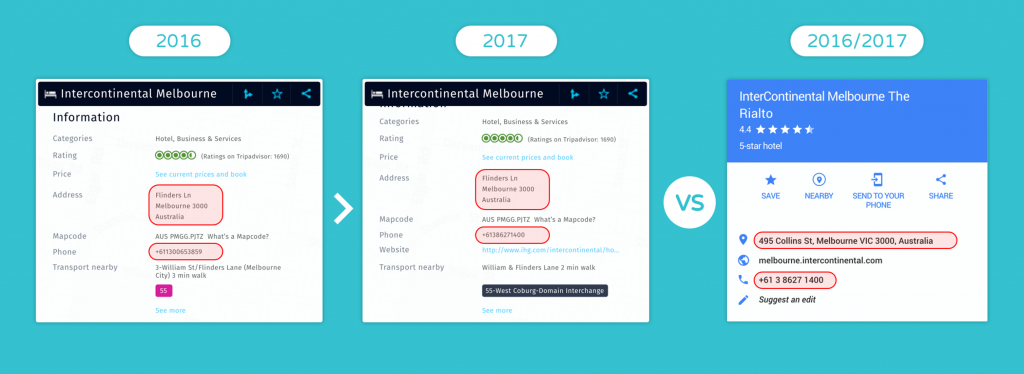In this data-driven age, it is easier then ever to find out information about, basically, anything. There are four main players in this process of searching and finding content online:
- Vendors who are selling geolocation content;
- Providers who are distributing it;
- End users or consumers of the content;
- Companies and businesses whose geolocation information is published.
Companies providing geolocation content are fighting for consumers, they aim to become distinguished from the others. Their main strength lies in the completeness and accuracy of the data they provide. Accurate and complete information affects not only the overall user experience and satisfaction but also businesses and organizations’ online visibility. Unfortunately, about 40% of geolocation content found online is not reliable and this is mostly due to the lack of standards around how this data is collected and reused.
CaseStudy
About a year ago, we were analyzing the online presence of several hotels. To demonstrate bad and inconsistent geolocation content and how it is changing during that period, we compared results retrieved in March, 2016, with results from today. In the image below, you can see search results for a hotel in Melbourne – Intercontinental Melbourne, the Rialto. If we compare results provided by the two most popular data providers, Google and HERE, we can see differences in the hotel’s information. Moreover, we can see that some, but not all, content has been updated and aligned with hotel’s official information (http://www.melbourne.intercontinental.com/). Back then, we found out that phone number provided by HERE was actually the telephone number of an agency in Melbourne and not the hotel.

Importance of Data Quality
To get a better understanding about the importance of data quality, you can look at the negative effects that inaccurate, incomplete, duplicated, and unreliable data gives to consumers, organizations, and companies:
- Consumers are losing their trust in the companies that provide data content.
- Vendors who provide bad data, and providers who distribute it, are loosing reliability, customers trust, and contracts.
- Search engines count on consistency of a business’ information across the web as an indicator of it’s quality when they rank the results displayed to the user. Bad ranking and inaccurate or incomplete information about a business directly affects business popularity.
- Due to the incorrect geolocation data, companies are losing clients/visitors/tourists which directly affects their yearly revenue.
- In the marketing field, location-based strategies and campaigns are becoming very popular, but there is a prediction that a large amount of businesses will be left out because of poor geolocation information.
- Bad Geolocation data directly affects the delivery services of companies dealing with geo location information, such as posts.
And this list goes on and on…
Conclusion
This highlights the importance of validating geolocation data prior to being used for any purpose. Additionally, publishing accurate data is not enough. Geolocation data needs to be monitored to keep it fresh and up to date.



